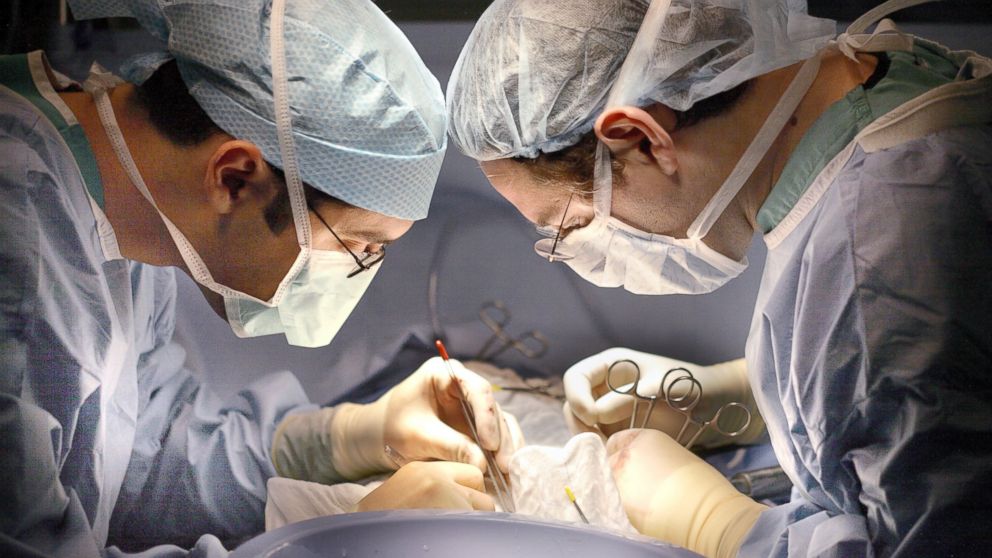First Liver Transplant Between HIV-Positive Donor and Recipient Marks Milestone for HIV Patients
Surgeons performed the surgery as part of a medical study.

— -- When Morris Murray was diagnosed with HIV in 1987, he thought he would be dead in a few years. But nearly 30 years since his diagnosis, Murray is still alive and now speaking about the importance of treating HIV as a chronic disease and not a death sentence.
Today, he spoke at Johns Hopkins University, where doctors performed the first liver transplant between a donor and recipient who are both HIV-positive. Doctors performed the operation on an unnamed patient who received a liver transplant from a deceased donor this week. It's the first transplant of its kind since the passage of the HOPE act, which overturned a federal law to allow transplants between HIV-positive donors and recipients.
Murray survived HIV but drugs in the 1990's that helped control the disease wreaked havoc on his liver. An hepatitis C infection contracted in the 1990's compounded the problem. More than 20 years after his HIV diagnosis, it was liver damage that nearly killed him.
"After the [new HIV drugs] came out, my viral load was undetectable and all of a sudden my liver enzymes start to elevate," Murray told ABC News today of drugs he took in 1996 and the ensuing liver damage. He was diagnosed with stage 4 liver disease in 2004.
In spite of his grave diagnosis, Murray struggled to get on the transplant list. Surgeons at Johns Hopkins would not list him, so they advised a select group of centers that would take him on. He was put an organ transplant list but had to travel from Baltimore to Philadelphia for treatment.
Once on the list, he faced multiple complications in part from ongoing issues with HIV infection and had to wait until 2012 to get an organ.
"I was getting sicker, there was no doubt about it," he recalled. Murray finally underwent a liver transplant in early 2013. The first transplant failed and doctors managed to give him a second transplant days later.
Murray said he would have taken an organ from an HIV-positive donor in a heartbeat during the many years he was sick.
"Yes, absolutely," Murray said, explaining he had serious complications, including enlarged veins in his esophagus that threatened to rupture. "I was constantly afraid. ... I'd swallow wrong then I’d lick my finger to see if it had blood on it or something."
In recent years, he's been advocating for more organ donation, especially for HIV-positive patients. At a news conference today, transplant surgeons said that the transplant, which is part of an ongoing medical study, could help them save hundreds of lives in the future.
Dr. Dorry Segev, a transplant surgeon at Johns Hopkins University, estimated there could be 1,000 transplants a year between HIV-positive donors and recipients.
"This could mean a new chance at life," he said. Segev and other surgeons had pushed to overturn the ban against HIV-positive organ donations that was a remnant from the 1980's when having HIV was thought to be a death sentence.
Segev spoke with ABC News in 2013, at the time legislation passed, about the possibility of saving lives.
"This is also great news for anyone on a transplant list, because the more organs we have for transplantation, the more lives will be saved," Segev said. "We estimated that there are hundreds of organs that could be used for HIV-positive patients who need them; the more we learn about this practice, the more those transplants will be possible."
Dr. Peter Stock, a professor of surgery and transplant surgeon at the University of California San Francisco, told ABC News at the time of the law passing that it was key to help HIV patients who often don't fare well on the transplant wait list.
"Right now in San Francisco if you're waiting for a kidney transplant you're waiting eight years. The organ shortage is eight years [long]," said Stock, who explained that by the time a person is sick enough to get an organ, they are often already on dialysis. "It turns out that HIV patients can't [survive to] there."
Looking back at nearly 30 years at early HIV diagnosis and treatment, Murray said he can't believe he's still here today.
"I never dreamed in 1987 when was first diagnosed with HIV that I would ever need a liver," he said.
The Associated Press contributed to this report.




